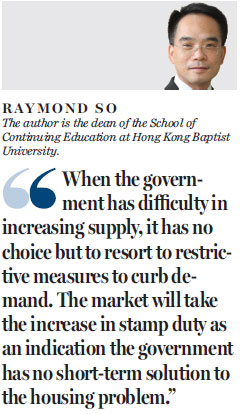New tax rate shows no quick fix to housing problem
Updated: 2016-11-10 10:11
By Raymond So(HK Edition)
|
|||||||||
Last week, the government announced that the stamp duty on property transactions for non-first-time buyers would be increased to a fixed 15 percent. The new tax rate will be applied to all individual and company buyers. The government claims this new measure will benefit first-time home buyers by curbing overall demand. However, it also indicates the government has difficulty in coping with the huge demand for housing at this moment. It could signal that future supply of homes cannot meet the demand; hence the authority needs to adopt new measures to control the growth in demand.
Previously, a progressive stamp duty has been used. Under that system, buyers of low-priced flats only needed to pay a lower stamp duty. In order to make it possible for buyers to avail themselves of a lower stamp duty, developers tended to build small flats priced at lower prices. With property prices having risen to extra high levels, the only way to keep flat prices low was to reduce the flat size. Hence, we are witnessing a common phenomenon: The average flat size is becoming smaller and smaller; and a new term "nano-house" has been coined for such tiny flats. This serves two purposes. To the buyers, their total budget will not increase as higher-per-square-foot prices will be offset by a smaller flat size. Also, because the prices of houses were kept low, the buyers need not pay a higher stamp duty.

Three years ago the government increased the stamp duty for non-first-time buyers once and slapped an extra stamp duty on non-resident buyers as one of its restrictive measures to curb demand for housing. The new change in stamp duty is similar to the increase three years ago; hence, the logic and reasons for both moves are similar. The government has tried to convince the market many times that there will be sufficient supply of houses in future. Nevertheless, the sharp increase in house prices in the past three years has cast doubt on such a promise. Transaction data for August and September shows that the number of buyers who need to pay the extra stamp duty has been increasing. It also shows that the number of property investor increases. This means that investors are willing to pay an extra amount of stamp duty because they considered the extra tax cost as part of the investment. When the investors expect property prices to stay strong in future due to insufficient supply, such added costs can be acceptable to the investors. In simple words, the investors simply treat the additional stamp duty as an increase in total investment cost. As long as property prices keep rising in the long run, they can still make a profit.
The strong demand for housing can be attributed to both the actual housing need of end-users and strong investment demand. The market stubbornly believes that future supply cannot meet the demand, which has fueled demand. The excessive liquidity in financial markets has also helped push property prices higher. Many investors still prefer property investment and this investment behavior is not easy to change. Also, many people perceive that the future supply of land will be more difficult to increase. The experience of developing the Northeast New Territories and also the recent Wang Chau saga show the difficulty involved in land development - not to mention the possibility of judicial reviews whenever there is a development plan. When these factors are considered, the demand for housing is likely to continue to exceed the supply.
The most logical way to deal with this is to increase supply. When the government has difficulty in increasing supply, it has no choice but to resort to restrictive measures to curb demand. The market will take the increase in stamp duty as an indication the government has no short-term solution to the housing problem.
(HK Edition 11/10/2016 page9)